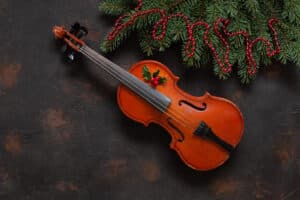
Tempo Press at the 2024 ASTA Conference
Thursday, March 21, 11:00am Ballroom D-E Vivace and ViBravo Orchestra Featured work: 1812 Overture Grade 3, String Orchestra, Peter Ilyich Tschaikowsky Arranged by Sandra Dackow
This work offers students access to the music of an important and under-recognized composer. The dynamics and expressive markings of the original piano version have, for the most part, been preserved. This invites a discussion on bringing out important moving melodic lines within a given dynamic. I recommend a gentle pulsation of the eighth-note accompanimental figures, played without accent or staccato in the middle to upper part of the bow. Strive for a connected legato stroke in the melodic lines, and emphasize the appoggiaturas throughout. Less advanced cellists may want to double and support the bass line. Though Mendelssohn Hensel does not indicate it, I recommend a ritardando in the penultimate measure. Students may be challenged by notes such as F♭, F double-sharp, and augmented intervals. Still, these challenges allow the director to discuss enharmonic equivalents, functional harmonic voice leading, and intervallic relationships.
Cellist and Pedagogue Daniel Levitov maintains a vibrant career as a performer and educator. Levitov performs locally and nationally as a soloist, chamber, and orchestral musician. Recognized by the Baltimore Sun for his “warmth of tone and phrasing” and “expressive force,” he is a founding member of the Clipper Mill String Quartet. Levitov also serves as a substitute cellist with the Baltimore Symphony Orchestra (BSO), and appears frequently with members of the symphony on the Chamber Music by Candlelight series. Levitov has performed as a soloist in Carnegie Weill Hall, on Strathmore Hall’s Music in the Mansion series, and at the Peabody Institute. He has performed as a concerto soloist with the Pazardjik Symphony (Bulgaria), the Manhattan Virtuosi, the Mendocino Festival Orchestra, and the Peabody Camarata. Levitov performed as a member of the Cabrillo Festival of Contemporary Music, under the direction of Marin Alsop. He recorded the jazz album, Moment to Moment: Roy Hargrove with Strings, which was released on the Verve label, and was a member of the Monterey Jazz Festival Chamber Orchestra.
Levitov is coordinator of cello and chamber music at the Peabody Institute Preparatory of the Johns Hopkins University. He is director of the Peabody Preparatory’s Young Artists Orchestra (YAO), an ensemble that he named and has developed since he joined the faculty of the Peabody Preparatory. Levitov is also strings specialist and String Ensemble director at the Bryn Mawr School in Baltimore. He has previously served as assistant professor of cello at the Sunderman Conservatory of Music at Gettysburg College. Levitov gives master classes and workshops across the country, including recent master classes for Indiana String Academy, University of Maryland, ASTA and the National Orchestra Festival. Levitov was featured on a CelloBello CelloChat in 2020. During the summer, he has served on the faculties of the Killington, Credo, and Foulger Music Festivals. Levitov’s students have won several competitions including ASTA and Washington Performing Arts Society, and have been accepted to major conservatories and Summer Festivals such as Juilliard, Oberlin, the Cleveland Institute, and the Manhattan School of Music, and Heifetz International Music Institute.
Levitov is active as a speaker and writer as well. He presents regularly at the American String Teacher’s Association (ASTA) National Conferences, and has published in Strings magazine. His teaching was featured in The Strad in 2020. Levitov is the contributing editor for “Two Octave Scales and Bowings for Cello” by Susan C. Brown, published by Tempo Press. He is a past president of the Maryland/DC ASTA chapter.
A native of Nebraska, Levitov holds a Doctor of Musical Arts degree from the City University of New York. He did his undergraduate work at the Oberlin Conservatory and received his Master of Music degree from the Manhattan School of Music, where he received the Janet Schenk award for distinguished service. Levitov has studied with cellists David Geber, Julia Lichten, Peter Rejto, Carol Work and Tracy Sands.

Thursday, March 21, 11:00am Ballroom D-E Vivace and ViBravo Orchestra Featured work: 1812 Overture Grade 3, String Orchestra, Peter Ilyich Tschaikowsky Arranged by Sandra Dackow

The holiday season is a time for celebrating with friends and family, and what better way to do so than through music? If you’re a

Everything you need to know about Tempo Press at the 2023 ASTA Conference.

Everything you need to know about Tempo Press at the 2022 Midwest Clinic.
Tempo Press
A Division of Luck’s Music Library
32300 Edward Ave
Madison Heights, MI 48071
Ph: 800-348-8749
sales@tempopress.com

Be the first to know about new music, exciting news, deals and more!